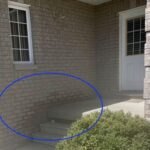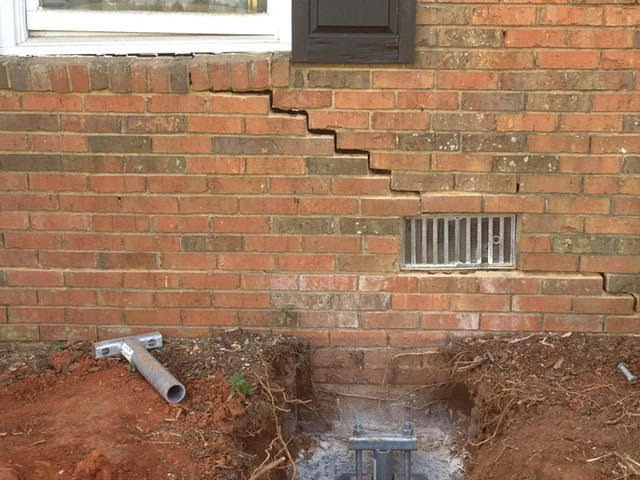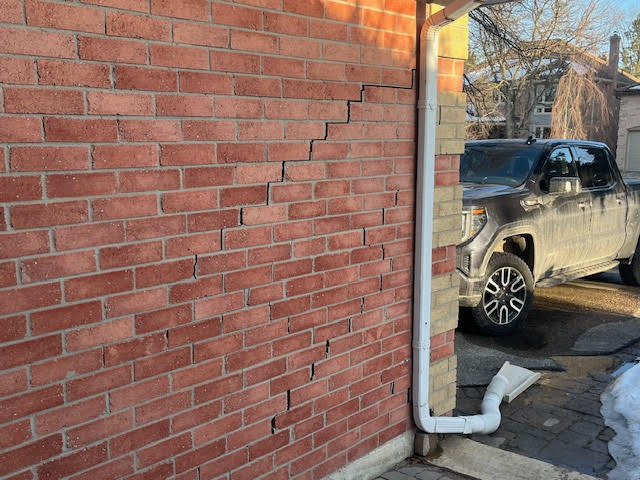
The Importance of Proper Ventilation in Masonry Structures
February 6, 2025
The Importance of Proper Ventilation in Masonry Structures
February 6, 2025Brick and Concrete Wall Cracks: Cosmetic Flaw or Serious Problem?
Noticing a crack in your wall can be concerning. While some cracks are harmless signs of a home settling, others could indicate a more serious structural issue.
One of the most common causes of significant cracks is a problem with the foundation—specifically, faulty footings. Here’s what you need to know about foundation issues, how they contribute to wall cracks, and when to take action.
Understanding Your Home’s Foundation and Footings
Your home’s foundation is responsible for distributing the weight of the structure evenly into the ground. Beneath the foundation are footings, which are thick, reinforced concrete slabs that support and stabilize the foundation walls. If these footings are poorly constructed, damaged, or compromised, they can lead to shifting, settling, or cracking in your home’s walls.
Common Causes of Faulty Footings and Foundation Problems
1. Poor Soil Conditions
• Expansive clay soils absorb moisture and swell, then shrink when dry, causing uneven pressure on the foundation.
• Loose or improperly compacted soil can cause the foundation to settle unevenly.
2. Poor Construction or Design Flaws
• If the footings were not poured deep enough or reinforced properly, they may fail to support the weight of the structure.
• Using substandard concrete or failing to allow it to cure properly can weaken footings over time.
3. Water Damage and Drainage Issues
• Excess water from poor drainage, leaking pipes, or heavy rainfall can erode soil around the footings, causing instability.
• Hydrostatic pressure (water pushing against the foundation) can lead to cracks and movement.
4. Tree Roots and Vegetation
• Large tree roots growing near the foundation can displace soil and disrupt footings, leading to cracks in walls.
5. Seismic Activity or Ground Movement
• Even minor shifts in the earth due to small tremors or local construction work can put stress on an already weak foundation.
Signs That Cracks Are Due to Faulty Footings
While minor cracks can be cosmetic, here are some warning signs that indicate your foundation might be the root cause:
• Large, Horizontal, or Stair-Step Cracks: These often appear in brick, concrete, or basement walls and suggest foundation movement.
• Cracks Wider Than 1/4 Inch: Any significant widening or separation in the crack can indicate structural stress.
• Cracks That Grow or Change Over Time: Mark the edges of the crack and monitor it over a few weeks—if it expands, your foundation may be shifting.
• Uneven or Sloping Floors: A settling foundation can cause floors to tilt, which is a major red flag.
• Doors and Windows Sticking or Misaligning: If doors or windows suddenly don’t close properly, the foundation could be shifting.
• Gaps Between Walls and Ceilings or Floors: If you notice separation where walls meet ceilings or floors, the structure may be moving.
What to Do If You Suspect a Faulty Foundation
Step 1: Conduct a Visual Inspection
Check both interior and exterior walls for cracks, gaps, or bulging. Look at your basement or crawl space for any signs of movement in the foundation walls.
Step 2: Monitor the Cracks
Take a picture and mark the crack’s edges with a pencil. If it grows wider over the next few weeks or months, call a professional.
Step 3: Address Drainage Issues
• Make sure gutters and downspouts direct water away from your foundation.
• Consider installing a French drain or sump pump if you notice excessive moisture near the foundation.
Step 4: Consult a Structural Engineer
If you suspect foundation issues, it’s best to get a professional opinion. A structural engineer can assess the damage and recommend solutions, such as:
• Underpinning: Strengthening the foundation by adding support beneath the footings.
• Piering or Helical Piers: Installing steel piers to stabilize and lift a sinking foundation.
• Slabjacking: Injecting material beneath a sunken slab to lift it back into place.
Final Thoughts
A crack in your wall isn’t always a sign of serious trouble, but when faulty footings or foundation issues are involved, early intervention is key. If you notice widening cracks, shifting walls, or doors that no longer fit their frames, don’t ignore it—get a professional inspection to prevent costly repairs down the road.
As a multiple award winning contractor, we always provide expert quality masonry and concrete services.
Get Started
Request for a quote
Contact us today for a personalized quote on your masonry or concrete project.


